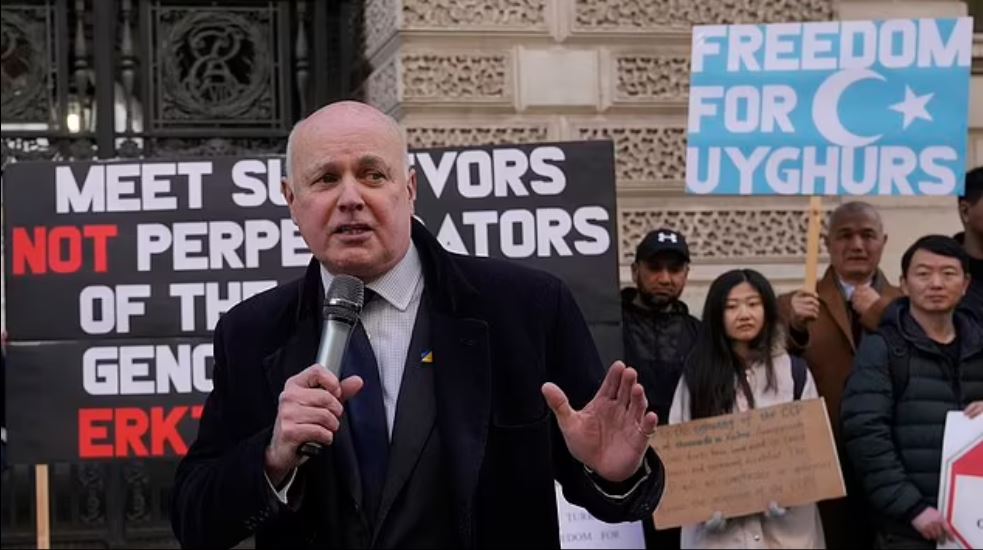Prepared by Ahmad Islam from Istanbul for Turkistan Times
May 11 2025
International hotel groups, including "International Hotel Groups" (IHG), parent company of the world-renowned Holiday Inn, are facing severe criticism over their plans to expand operations in East Turkistan under Chinese occupation. This criticism comes amidst the escalating human rights tragedy in the region, including crimes against humanity targeting Uyghur Muslims, and oppression recognized as genocide by some countries and international bodies. These companies are accused of disregarding human values and seeking profit from a region where oppression continues.
According to a Daily Mail article by Kumail Jaffer on May 9, 2025, International Hotel Groups (IHG) is currently managing four hotels in East Turkistan and plans to open more than 16 additional hotels. This situation occurs at a crucial moment when the Chinese government's systemic repression against Uyghurs, including mass detention, forced labor, religious and cultural genocide, and imprisonment in internment camps, is widely known to be ongoing, and these actions are recognized as "genocide" by many countries and human rights bodies.
Reactions from Parliamentarians and Rights Organizations
This issue has stirred significant concern in the UK Parliament and among international human rights organizations. A group of UK Members of Parliament (MPs), including former Conservative Party leader Sir Iain Duncan Smith, sent a formal letter to IHG, requesting detailed clarification about its business activities in East Turkistan. The letter, supported by the Inter-Parliamentary Alliance on China (IPAC), called for IHG to immediately reconsider its expansion plans, in light of the severe oppression in the region.
The MPs specifically warned that operating luxury hotels in East Turkistan would assist the Chinese regime's propaganda efforts to whitewash the human rights crisis, contributing to concealing the region's reality and creating a false, artificial image.
Dr. Henrik Sadievski, Research Director at the Uyghur Human Rights Project (UHRP), strongly emphasized that international hotel chains like IHG are attempting to project a false sense of normalcy in the region. He stated: "By providing high-end accommodation and leisure facilities, international hotel chains are complicit in promoting a sanitized, unrealistic image of the region. This directly serves Beijing's propaganda aimed at covering up the oppression."
This sentiment was reiterated by Luke de Pulford, Executive Director of the Inter-Parliamentary Alliance on China (IPAC). He strongly criticized companies for expanding operations in East Turkistan, specifically stating that conducting independent and meaningful human rights due diligence is impossible given the pervasive fundamental human rights violations in the region.
Scale of International Hotel Presence and the Ethical Dilemma
According to data from the Daily Mail, it was revealed that as of April 2025, at least 115 hotels from various international brands were operating in East Turkistan, with another 74 in the planning stage. The significant presence of this number of international hotel chains clearly underscores the severe ethical dilemma faced by businesses in a region where the Uyghur population is facing imprisonment in internment camps, forced labor, and cultural genocide.
The expansion of these hotels not only brings economic benefits but also carries the risk of legitimizing the Chinese regime's oppressive actions by creating an image of false economic prosperity and artificial stability. This helps to create an appearance of "normal life" in an environment where human rights violations are ongoing, with the aim of concealing the region's reality and diluting international criticism.
Corporate Responsibility and the Consumer's Role
Rights organizations such as "Stop Uyghur Genocide" have previously accused companies like the fast-fashion giant "Shein" of benefiting from forced Uyghur labor. The Daily Mail report noted that Luke de Pulford urged consumers to "vote with their feet" by boycotting companies that prioritize profit over human rights. This highlights the importance of public pressure in influencing corporate behavior.
The article also highlighted the difficulty of conducting human rights investigations in East Turkistan due to the Chinese government's strict control and restriction of independent inspections. This lack of transparency complicates companies' efforts to ensure their activities do not contribute to or benefit from the oppression against Uyghurs.
International Pressure and Future Developments
The concern expressed by senior MPs and organizations like the Uyghur Human Rights Project (UHRP) and IPAC regarding corporate activities in East Turkistan indicates growing international scrutiny and may pressure companies like IHG to re-evaluate their presence in the region.
For this systemic issue, it is vital for every conscious consumer worldwide to take an active stance, showing solidarity with the Uyghurs facing the human rights crisis in East Turkistan through conscious consumption choices, and contacting their representatives to exert pressure and increase international scrutiny.
Profit or Human Dignity?
This situation, which exposed how IHG's business interests in East Turkistan are intertwined with the human rights tragedy faced by Uyghurs, has drawn severe criticism because the company is profiting from ongoing Uyghur oppression in the region. The demands from UK MPs and rights organizations highlighted the urgent need for greater corporate accountability and transparency.
As global awareness of the Uyghur crisis grows, companies are facing strong pressure to align their actions with ethical standards, or risk being complicit in human rights violations. This situation serves as a reminder of the grave ethical responsibility of conducting international business in regions experiencing oppression and resistance.
Therefore, the international community, governments, and human rights organizations must act collectively to demand an end to companies like IHG profiting from crimes against humanity in East Turkistan. Only with such united efforts can companies be compelled to conduct ethical business and contribute to ending the oppression of the Uyghur people.

